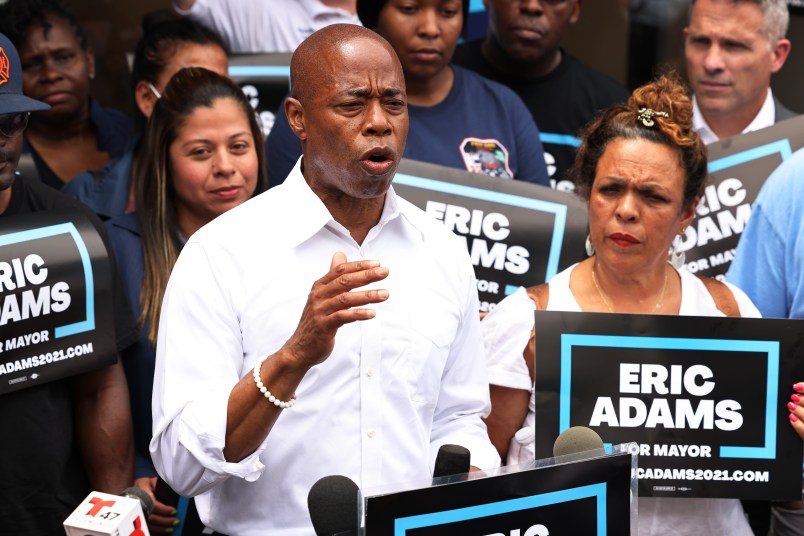The New York mayoral Democratic primary quickly turned acrimonious with a bruising few last days before polls opened on Tuesday.
During the stretch when candidates in other ranked-choice races choose cordiality over criticism so as to not alienate possible number two votes, Brooklyn borough president Eric Adams in particular assembled his top surrogates to lambaste former presidential candidate Andrew Yang and former sanitation commissioner Kathryn Garcia, who’d formed a sort of last-minute alliance.
“Those kinds of attacks are not usually associated with winning tactics,” said Rob Richie, president of electoral reform group FairVote. “Though, he’s super well positioned to win.” FairVote paired with Citizen Data to poll the field last week, finding Adams to have a “commanding lead.” Other recent polls of NYC voters have shown similar results, though ranked-choice elections are hard to poll.
In New York’s ranked-choice system, voters can rank up to five candidates in order of preference. If no candidate tops 50 percent in the first round, the candidate with the fewest votes is eliminated, and their voters’ second choice becomes their first choice. The cycle continues until one candidate tops 50 percent, and the tallying may take weeks. Whoever wins the Democratic primary will be a heavy favorite in the November general election.
Yang encouraged his voters to rank Garcia number two; Garcia didn’t explicitly say the same, though she appeared at campaign stops with Yang and handed out joint literature.
In response, not only did Adams go after the candidates themselves — and did he ever, calling Yang a “liar” and a “fraud” on Monday — but, more worrying to voting rights advocates, he aimed some of his fire at their strategy to campaign together. It’s the city’s first time using ranked-choice voting, since almost three-fourths of voters approved use of the method in a 2019 ballot measure.
Adams’ campaign sent out a press release quoting surrogates calling the alliance “voter suppression” and a “cynical attempt by Garcia and Yang to disenfranchise Black voters.” Adams himself called the pairing up an attempt to box a “person of color” out of the mayorship — though Yang is Asian American — and said he thought they announced their alliance on Juneteenth as a deliberate slight against him.
The attacks alarmed certain ranked-choice voting advocates enough that a couple prominent good government groups sent out a statement noting that joint efforts like Yang’s and Garcia’s were a feature, not a bug, of ranked-choice voting.
“There is nothing insidious or cynical about two candidates transparently using a legitimate strategy in a democratically approved system of election,” said Susan Lerner, executive director of Common Cause New York, and Sean Dugar of Rank the Vote NYC in a statement. “Candidates should keep their criticism to the issues, rather than mischaracterizing a strategy that is available to all who choose to use it.”
They added that ranked-choice voting incentivizes consensus building, and gives voters a louder voice and more choice at the ballot box.
With the wounds from former President Donald Trump’s constant baseless claims of voter fraud in 2020 still fresh, race watchers have scrutinized Adams for further doubt-sowing. He was asked Monday if he’d promise that he won’t claim the election was stolen from him, should he ultimately lose.
“Yes I do, I assure voters that no one is going to steal the election from me,” he responded.
It’s an odd tack, said FairVote’s Richie, given that he thinks Adams will perform well with the new system.
“He supported ranked choice on the ballot 2019 — he was a public endorser — but somewhere along the way some people, maybe his own conclusion or the people advising him, said that it may not be good for you,” Richie said. “In reality, it is good for him and he’s proving to be a strong ranked choice candidate.”
“It’s a risky strategy that I see his campaign doing in the last 48 hours,” he added.







I’m not so sold on ranked choice voting. The primary has been a complete shit show. And our reward will be Eric Adams.
And remember how ranked choice was going to doom Susan Collins and deliver us a Manchin proof majority?
I think the general idea is fine, I’m not so sure about the implementation bit of dropping the lowest candidate and redistributing, then the next last and so on. Seems to me that that can open up a different result than if you, say, tallied the second choices of the top two candidates, or second choice of all candidates.
Not knowing all the features of rank voting and guessing it can be different in different jurisdictions and being to lazy to look up New York’s system, I have some questions.
Is it only first and second choice or can you give a third, forth…?
Also, is it applicable to both the primary and the general election? In my opinion it “ranked choice voting” should only be in a primary where you are picking within a Party and therefore the differences between candidates is less pronounced.
The great thing about ranked choice voting is that it lets you vote against “that guy”, without having to vote for a different and slighly less odious asshole. I’ve done that a few times where I filled in my rankings to reflect that. It helps prevent a plurality winner that never should have happened except by getting lucky with two other candidates splitting a party’s vote.
Also, I wonder if it would help prevent the florida gop tactic of running fringe third candidates with similar sounding names to the democratic candidate, to split off enough of the vote to make a difference.
I think NYC allows up to five options. Definitely are variants. Conceptually it’s good, because you don’t have the same third-party spoilers, but the design could be better.